| Srl | Item |
| 1 |
ID:
099316
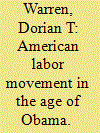

|
|
|
|
|
| Publication |
2010.
|
| Summary/Abstract |
The relative weakness of the American labor movement has broader political consequences, particularly for the ambitions of the Obama presidency. Absent a strong countervailing political constituency like organized labor, well-organized and more powerful stakeholders like business and industry groups are able to exert undue influence in American democracy, thereby frustrating attempts at political reform. I argue that it is impossible to understand the current political situation confronting the Obama administration without an account of the underlying sources of labor weakness in the U.S. In such an account two factors loom especially large. One is the role of the state in structuring labor market institutions and the rules of the game for labor-business interactions. The second is the distinctively racialized character of the U.S. political economy, which has contributed to labor market segmentation, a unique political geography, and the racial division of the U.S. working class. In our current post-industrial, post-civil rights racial and economic order, whether and how the labor movement can overcome its historical racial fragmentation will determine its possibilities for renewal and ultimately its political strength in relation to the Obama presidency. If the labor movement remains an uneven and weak regional organization hobbled by racial fragmentation, the Obama Administration's efforts to advance its core policy agenda will lack the necessary political force to be effective.
|
|
|
|
|
|
|
|
|
|
|
|
|
|
|
|
| 2 |
ID:
177052
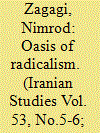

|
|
|
|
|
| Summary/Abstract |
The history of the oil industry’s labor movement during the 1940s has often focused on the Tudeh’s ability to act overtly and rally the masses of workers. Thus, more often than not, the importance of union underground activity and the role played by the masses of ordinary oil workers during times of political and military repression, is overlooked. This article examines how the particular setting of the oil town of Abadan influenced motivations of oil workers and the dynamics between them and the Tudeh. As the article aims to show, these elements were an essential part in the ability of the labor movement in Abadan to remain viable and reemerge in force in the early 1950s as part of the oil nationalization movement.
|
|
|
|
|
|
|
|
|
|
|
|
|
|
|
|
| 3 |
ID:
126962
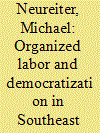

|
|
|
|
|
| Publication |
2013.
|
| Summary/Abstract |
This study argues that well organized labor movements and increasing labor mobilization played a crucial role in the democratic transitions in Indonesia in 1998 and the Philippines in 1986. In contrast, the presence of less active and less organized labor unions in Malaysia, Myanmar, and Singapore appears to be an important reason for the durability of authoritarianism in those countries.
|
|
|
|
|
|
|
|
|
|
|
|
|
|
|
|
| 4 |
ID:
026040


|
|
|
|
|
| Edition |
1st ed.
|
| Publication |
London, Faber and Faber, 1972.
|
| Description |
591p.Hbk
|
| Standard Number |
0571097731
|
|
|
|
|
|
|
|
|
|
|
|
Copies: C:1/I:0,R:0,Q:0
Circulation
| Accession# | Call# | Current Location | Status | Policy | Location |
| 008983 | 946.081/BRO 008983 | Main | On Shelf | General | |
|
|
|
|
| 5 |
ID:
130509
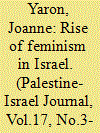

|
|
|
|
|
| Publication |
2011.
|
| Summary/Abstract |
what we know today as the state of Israel was not really established as an independent state in 1948 following what is called the "war of independence. It was established slowly, step by step, by waves of Jewish Immigration to what was then know as Palestine, a province of the fading Ottoman Empire. At the time, the main source of this immigration were Czarist Russia and the United Kingdom.
|
|
|
|
|
|
|
|
|
|
|
|
|
|
|
|
| 6 |
ID:
145059
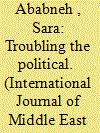

|
|
|
|
|
| Summary/Abstract |
The Jordanian Day-Waged Labor Movement (DWLM) played a central role in the Jordanian Popular Movement (al-Hirak al-Shaʿbi al-Urduni), commonly referred to as Hirak, from 2011 to the end of 2012. The large number of women who were active and took on leading roles in the DWLM contrasts with the absence of women's rights organizations in the Hirak. I argue that the DWLM was able to attract so many women because it developed a discourse and flexible structure that understood women to be embedded within communities and prioritized their economic needs. By studying this discourse and structure, it is possible to learn important lessons about gender-inclusive political and institutional reform.
|
|
|
|
|
|
|
|
|
|
|
|
|
|
|
|
| 7 |
ID:
102731
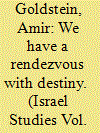

|
|
|
|
|
| Publication |
2011.
|
| Summary/Abstract |
The struggle between the workers' parties and the right-wing Revisionists took an increasingly central place in Zionist history beginning in the 1930s. The Labor Movement gained political hegemony during the period of the Yishuv (pre-state Israel). When Jabotinsky tried to challenge Mapai's power position he suffered a bitter defeat. Most of Israel's first 13 years were marked by political polarity between Mapai and the Herut Movement (the latter led by Begin). Herut received a thrashing in the Knesset elections in 1951 and the General Zionists (GZ) became the second largest party after riding on the wave of middle class protest against the Mapai led government austerity regime. However, it failed to exploit its broad support into a permanent electoral base that would transform the right-center bourgeoisie into a political force that would serve as an alternative to Ben-Gurion's government. In the summer of 1955, Herut replaced the GZ as the second largest Knesset party, and in 1959, Begin became head of the opposition after Herut won 17 seats, twice as many votes garnered by the GZ, which was reduced to its political size of the first Knesset elections in 1949. The key political rivalry returned to the power struggle between the Zionist left and the nationalist right.
|
|
|
|
|
|
|
|
|
|
|
|
|
|
|
|